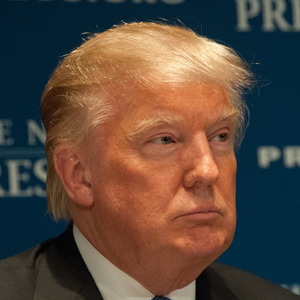Trump interviewed this SCOTUS shortlister last weekend: How has he ruled?

Photo of President-elect Donald Trump from Albert H. Teich / Shutterstock.com
Donald Trump has reportedly interviewed a possible U.S. Supreme Court nominee—Judge William Pryor of the Atlanta-based 11th U.S. Circuit Court of Appeals.
Above the Law reports that the meeting occurred Saturday afternoon in New York. The blog does not identify any source for its information. Later Monday, the Associated Press also reported that a meeting between Trump and Pryor took place..
Trump has said he is selecting a judge from among 20 possible candidates he has named, and he hopes to do so within two weeks of his inauguration. Some Supreme Court journalists have said the longer list has been shortened to five to eight names, and Pryor is one of the judges on the shortened list.
Above the Law previously gave the best chances to Pryor and Judge Diane Sykes of the Chicago-based 7th U.S. Circuit Court of Appeals. The blog noted that Pryor is a solid conservative, he is from Alabama, and he is friends with Sen. Jeff Sessions, Trump’s pick for attorney general. Pryor was deputy attorney general when Sessions was Alabama attorney general, and later served as Alabama attorney general from 1997 to 2004.
Pryor has previously criticized Roe v. Wade, calling it the “worst abomination in the history of constitutional law.” But that may not be an impediment, Above the Law says. “The success of Sessions shows that what gets liberals all hot and bothered isn’t necessarily enough to stop a nominee,” the blog says, “and this might encourage the Trump Administration to ‘go bold,’ swing for the fences, and put up Pryor.”
SCOTUSblog has posted a nominee profile of Pryor, who is 54 years old. He graduated from Tulane University’s law school in 1987, and clerked for Judge John Minor Wisdom of the New Orleans-based 5th U.S. Circuit Court of Appeals.
When he was Alabama’s attorney general, Pryor had supported the removal of Alabama Chief Justice Roy Moore because the judge ignored a court order to remove a Ten Commandments monument from the state supreme court building.
Pryor had previously said he believed the Ten Commandments display was constitutional, but he said after Moore’s removal that court orders must be obeyed, according to this CNN story.
Also during his term as attorney general, Pryor wrote a brief defending the Texas law banning sodomy that was later overturned by the U.S. Supreme Court.
SCOTUSblog’s analysis of Pryor’s judicial record says he is “no friend of criminal defendants” and he has “almost never ruled in favor of a capital defendant.”
In civil rights cases, SCOTUSblog writes, Pryor “has been a strong proponent of religious freedom, has been perhaps surprisingly receptive to claims of discrimination by LGBTQ plaintiffs, and has voted to reject voting rights challenges in the small number of such cases he has confronted.”
Pryor’s most significant decision in the area of LGBT rights was one he joined, according to SCOTUSblog. The decision, Glenn v. Brumby, found that Georgia officials violated the equal protection clause when they fired an employee for being a transgender woman.
He generally favors the government in immigration cases, though there are exceptions, particularly in cases raising a fear of religious persecution.
On free speech issues, SCOTUSblog says, “Pryor has steered a middle course.” He has stressed the importance of First Amendment rights, yet is inclined to uphold government restrictions on speech in some contexts.
Pryor has upheld congressional power in the few federalism cases he has considered. He has rejected commerce clause challenges to several criminal laws, and he ruled that the U.S. Department of Agriculture had the power to regulate cats at a Hemingway museum because they affect interstate commerce.
Updated Jan. 18 to note Associated Press coverage.



